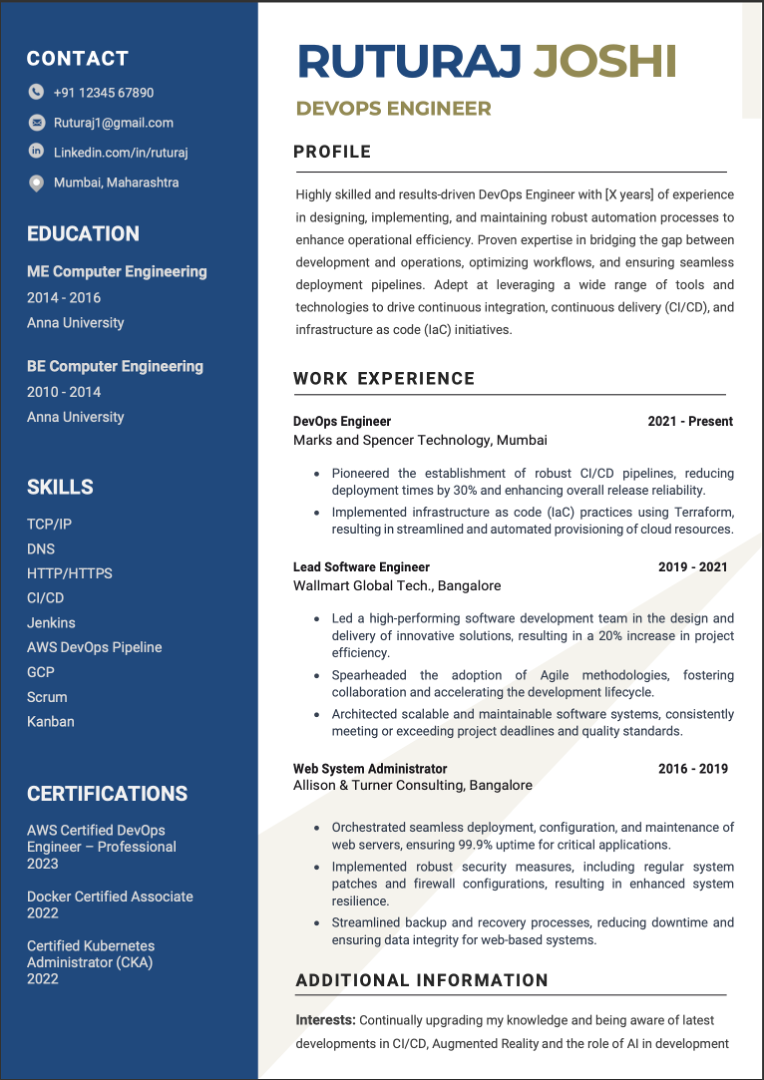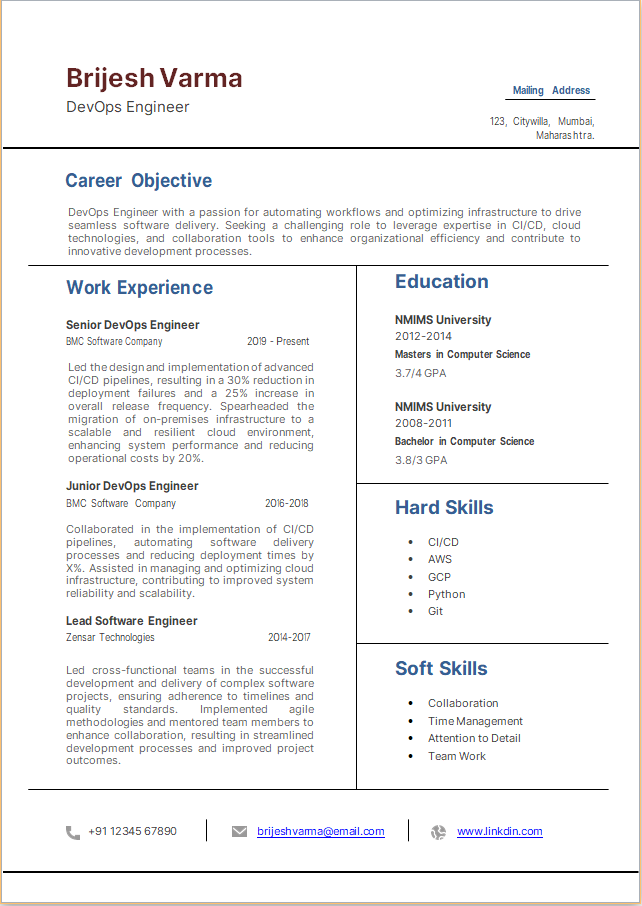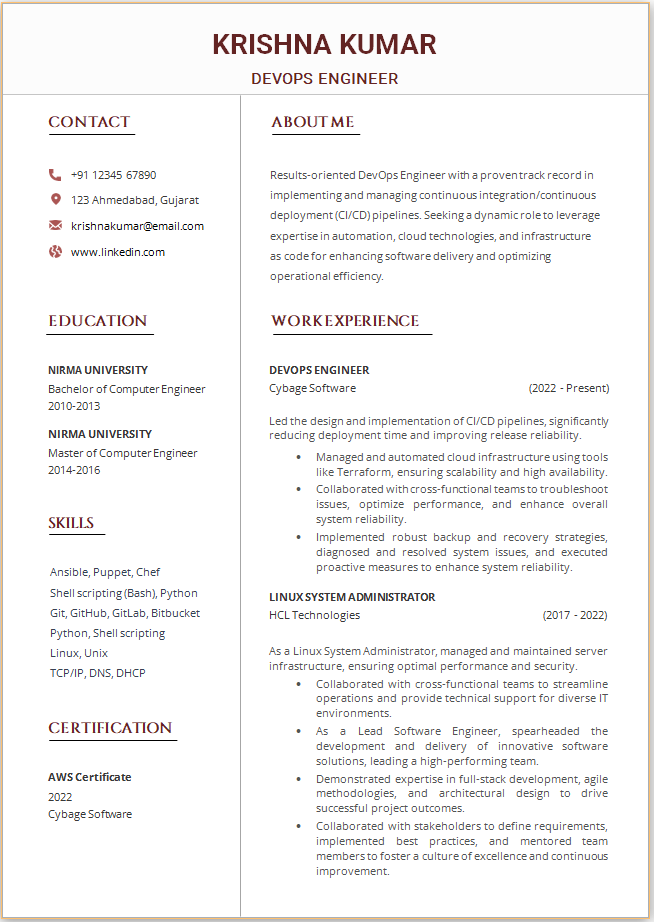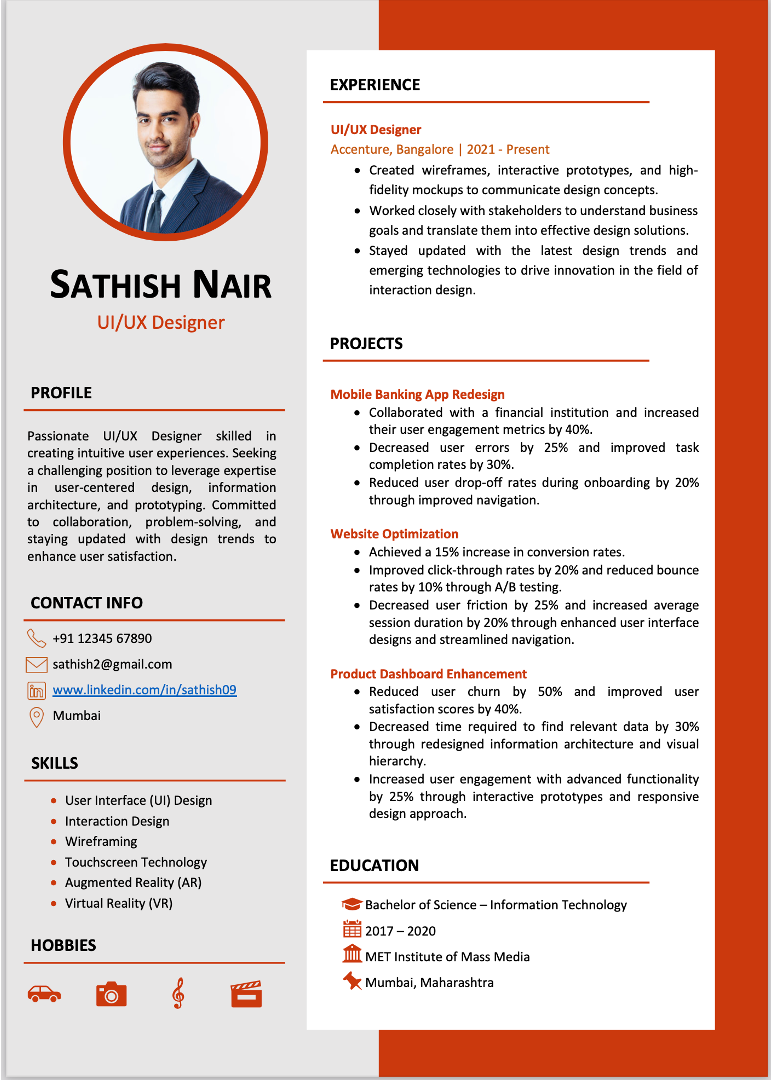Modern Resume
DevOps Engineer MS Word Sample Resume
DevOps Engineer Sample
devopsEng

Objective
If you do not like the longer version of the statement we included in the template, you can consider something simpler like this one. "Results-driven DevOps engineer with [X years] of experience optimizing development pipelines and enhancing system reliability. Seeking a challenging role to leverage automation and cutting-edge technologies in streamlining software delivery processes. Dedicated to driving efficiency and collaboration between development and operations teams to achieve scalable and secure infrastructure solutions."
Education
ME Computer Engineering
2014 - 2016
Anna University
BE Computer Engineering
2010 - 2014
Anna University
Skills
TCP/IP DNS HTTP/HTTPS CI/CD Jenkins AWS DevOps Pipeline GCP Scrum Kanban
Interests/Hobbies
Including relevant hobbies and interests on a DevOps engineer resume can provide a glimpse into your personality, teamwork, and interests outside of the professional realm. Here are some hobbies and interests that might be relevant for a DevOps engineer: Open Source Contributions: Actively contributing to open-source projects demonstrates a commitment to community collaboration, continuous learning, and sharing knowledge with the broader tech community. Home Lab Projects: Mentioning personal projects or experiments conducted in a home lab environment showcases your passion for hands-on learning, experimentation with new technologies, and a proactive approach to skill development. Scripting and Automation as a Hobby: If you enjoy scripting or automation as a hobby, it aligns well with the nature of DevOps work. It indicates a genuine interest in finding efficient and automated solutions to everyday tasks. Participation in Tech Meetups or Conferences: Attending or organizing tech meetups and conferences demonstrates a commitment to staying current with industry trends, networking with professionals, and engaging with the broader tech community. Blogging or Technical Writing: If you maintain a blog or engage in technical writing, it highlights your ability to communicate complex technical concepts effectively. This hobby showcases your dedication to knowledge-sharing and community building. Docker/Kubernetes Enthusiast: Expressing an interest in exploring Docker or Kubernetes for personal projects or experimentation indicates a passion for containerization and orchestration technologies, which are highly relevant in DevOps. Home Automation Projects: Involvement in home automation projects showcases your practical application of DevOps principles in personal environments. It reflects creativity and an ability to implement solutions beyond the workplace. Contributions to Tech Forums or Q&A Sites: Being active on tech forums, Stack Overflow, or other Q&A sites reflects a willingness to help others, share knowledge, and collaborate within the tech community. Participation in Coding Challenges or Hackathons: Engaging in coding challenges or hackathons, even for fun, highlights your competitive spirit, problem-solving skills, and the ability to work well under time constraints – all valuable traits for a DevOps engineer. Remember to choose hobbies and interests that genuinely align with your passions and showcase skills relevant to the DevOps field. When including these on your resume, briefly mention how these activities have contributed to your professional growth or skills development. Additionally, be mindful of the space on your resume and ensure that the information remains concise and impactful.
Experience
Another set of examples to show you how you can summarise your work accomplishments.
DevOps Engineer
2021 - Present
• Implemented and optimized CI/CD pipelines, reducing deployment times by 30% and significantly enhancing release reliability.
• Pioneered the adoption of Infrastructure as Code (IaC) using Terraform, resulting in the efficient and automated provisioning of cloud resources.
Lead Software Engineer
2019 - 2021
• Led a high-performing software development team in delivering innovative solutions, contributing to a 20% increase in project efficiency.
• Spearheaded the implementation of Agile methodologies, fostering collaboration and accelerating the development lifecycle.
• Architected scalable and maintainable software systems, consistently meeting or exceeding project deadlines and quality standards.
Web System Administrator
2016 - 2019
• Orchestrated the seamless deployment, configuration, and maintenance of web servers, ensuring 99.9% uptime for critical applications.
• Implemented robust security measures, including regular system patches and firewall configurations, resulting in enhanced system resilience.
• Streamlined backup and recovery processes, reducing downtime and ensuring data integrity for web-based systems.
Additional Inputs
Most relevant skills to include on your DevOps Engineer resume
Including these skills on a DevOps engineer resume is crucial as they represent a blend of foundational networking knowledge, key technologies, and agile methodologies. Here's a brief comment on the importance of each skill:
TCP/IP:
Understanding TCP/IP is fundamental for DevOps engineers as it forms the basis of network communication. It is crucial for troubleshooting, optimizing, and securing network connections in a DevOps environment.
DNS (Domain Name System):
Knowledge of DNS is essential for managing domain names, resolving hostnames to IP addresses, and ensuring reliable communication between various services and systems in a distributed environment.
HTTP/HTTPS:
DevOps engineers need a solid understanding of HTTP/HTTPS protocols as they are fundamental to web communication. Knowledge of these protocols is crucial for managing web applications, APIs, and ensuring secure data transfer.
CI/CD (Continuous Integration/Continuous Deployment):
CI/CD is at the core of DevOps practices. Including this skill indicates proficiency in automating the software development lifecycle, ensuring faster and more reliable delivery of applications, and promoting a culture of continuous improvement.
Jenkins:
Jenkins is a popular open-source automation tool used for CI/CD. Highlighting Jenkins on a resume indicates expertise in setting up, configuring, and managing automation pipelines for building, testing, and deploying applications.
AWS DevOps Pipeline:
Knowledge of AWS DevOps services demonstrates expertise in leveraging cloud-based tools for automating and orchestrating the software delivery process. It showcases adaptability to cloud environments.
GCP (Google Cloud Platform):
GCP skills signify a broader understanding of cloud platforms, allowing DevOps engineers to work seamlessly across different cloud providers. This demonstrates flexibility and the ability to adapt to varying cloud infrastructures.
Scrum:
Comment: Scrum is an agile framework for project management. Including Scrum on a DevOps resume indicates familiarity with agile methodologies, iterative development, and collaboration, which are essential in modern software development.
Kanban:
Knowledge of Kanban, another agile methodology, highlights an understanding of visualizing and optimizing workflows. This skill is valuable for DevOps professionals involved in continuous improvement and efficiency.
In summary, including these skills on a DevOps engineer resume is essential for showcasing a well-rounded expertise that spans networking fundamentals, modern DevOps practices, relevant tools, and agile methodologies. It reflects the ability to contribute to the efficient and collaborative delivery of software in dynamic and cloud-centric environments.


